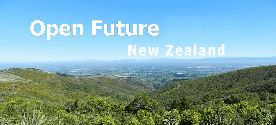
Open Future New Zealand
To make the future open, we need to develop a lifestyle which is both ecologically and economically viable.
Green Business Solutions by  John S Veitch
John S Veitch
I've been advocating green business ideas for some 40 years. The problem has always been that compared with traditional business thinking, the "rate of return" on green business ideas looked small. But it depends on what you measure. All green business ideas produce value that isn't captured as monetary returns.
New Economic Thinking
We need to understand Economics in a new way. We cannot build a better world based on the idea that the economy can GROW indefinitely. Despite the intention to grow the world economy in the last 50 years, the huge effort has been met by a large degree of failure. For instance in the USA, and many more developed countries, real wages have been falling for about 30 years. Yes, there has been economic development in India, China and Brazil, but it's very uneven and has not benefited the general population. There is much wrong with what we are trying to do which tends to close the future.
Dr David Suzuki’s Prediction for the Future
Dr David Suzuki (9 minutes)
Published by: Yahoo Australia - July 2021
The Super Species Out of Control
Dr David Suzuki, award-winning scientist and environmentalist, talks to Yahoo-Australia about why humans are the real reason our planet is degrading at such a fast rate and how we can turn this around.
Many countries have realized that environmental conservation is good for the economy - and they're taking action. Places like Sweden, Germany, the U.K., Denmark, and the Netherlands are strategically using public policies such as ecological fiscal reform to spur innovation, investment, technological progress, and behavioural change.
In contrast, the USA, Canada, Australia and New Zealand have been reluctant to use strong regulations or economic disincentives to protect the environment. We're in a car traveling at 100 miles an hour towards a brick wall. We're arguing about which one of us has the best seat. That's the wrong question.
I'm not an optimist, nor a pessimist. I live in hope that we'll come to our senses and realise that we are responsible. The planet will do very well without us. Life is very resilient, the world will be fine, but humanity is at risk.
![]() David Suzuki co-founded the David Suzuki Foundation in 1990.
David Suzuki co-founded the David Suzuki Foundation in 1990.
Closing the System
We know that the present economic system is using more resources than the earth can sustain. We are destroying the environment we depend on for life. In 2007 the economic effect of global warming was placed squarely before us by Sir Nicholas Stern. He predicted a 20% decline in future economic activity. It seems here in the beginning of 2009, that we already have an economic decline that in two years could be of that order, although with a slightly different cause.
Making the closed system more open
This could be an opportunity for new investment that will transform the economy to make better use of our scarce resources. The central challenge for boardrooms is to reinvent businesses as institutions. We need better governance, a workable shareholder democracy, improvement in accounting and timely reporting, the creation of authentic value, the building of trusting relationships, and the rediscovery of the real work of each business.
The recovery of the economy won't be quick. The peak oil problem hasn't been solved, it's just that demand for oil is subdued, and that's exactly what the environment needs right now. But we don't want to come out of the depression and head right into oil prices at $200 a barrel. When we come out of the depression we need to have alternative means of supplying our transport needs, and green ways of meeting our non-transport energy requirements. That's going to take time, Maybe ten years.
In addition we need to solve the climate change problem, to move away from the use of fossil fuels as energy sources and apply long term thinking to the recovery process. This time it's probably the production and burning of coal that we need to examine. There is a lot of talk about "clean coal" or "green coal" but is seems to be all green wash at the moment. Alternatives to coal are available, more expensive, yes, but in my view part of a necessary cost.
Find out what's new here. (Google searches)
The city of Portland has build 40 high performance ![]() green buildings, creating 10,000 multi-family units and 500 weatherized homes.
green buildings, creating 10,000 multi-family units and 500 weatherized homes.
Albuquerque now gets 20% of it's energy from ![]() wind farms.
wind farms.
Some countries have begun to make plans to lead the way on ![]() Climate Change action.
Climate Change action.
Many companies are working to become ![]() carbon neutral producers.
carbon neutral producers. ![]() Green America Today
Green America Today